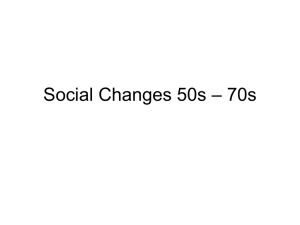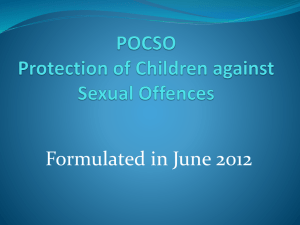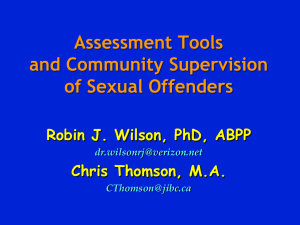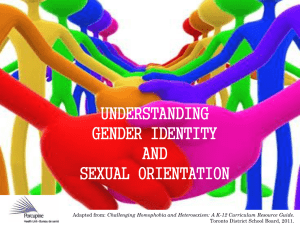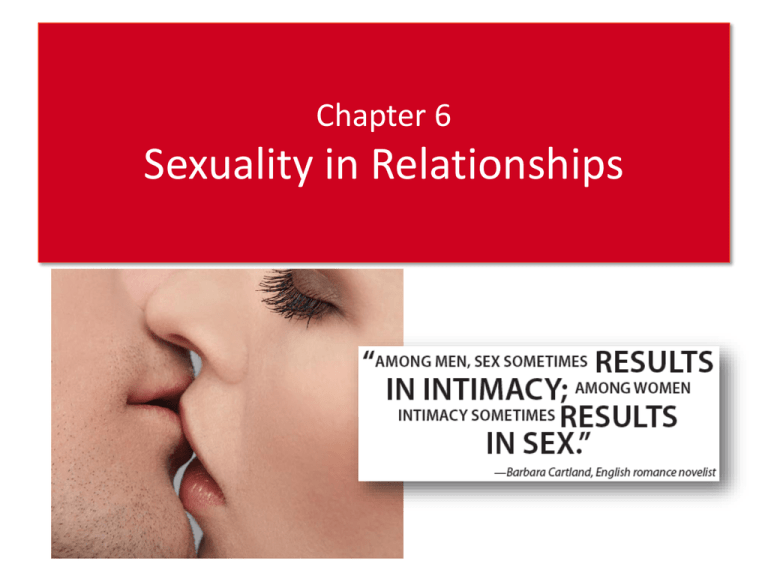
Chapter 6
Sexuality in Relationships
Chapter Sections
•
•
•
•
•
•
•
•
6-1 Sexual Values
6-2 Alternative Sexual Values
6-3 Sexual Double Standard
6-4 Sources of Sexual Values
6-5 Gender Differences in Sexuality
6-6 Pheromones and Sexual Behavior
6-7 Sexuality in Relationships
6-8 Safe Sex: Avoiding Sexually Transmitted
Infections
• 6-9 Sexual Fulfillment: Some Prerequisites
Sexual Values
• Sexual values
– moral guidelines for sexual
behavior in relationships
– Do attitudes and values predict
sexual behavior?
Three specific types of Sexual Values
1. Absolutism
– a belief system based on unconditional allegiance
to the authority of religion, tradition, or law
– Official creeds of fundamentalist Christian and
Islamic religions encourage absolutist sexual
values.
– Can religion provide a good source of sexual
orientation in terms of values and practices?
http://www.npr.org/2011/03/10/133245874/unprotected-texts-the-bible-on-sex-and-marriage
Alternative Sexual Values
True Love Waits
• international campaign
challenging teenagers to
remain sexually
abstinent until marriage
• How Effective do you
think these efforts are?
Alternative Sexual Values
Absolutism
• Virginity pledges have not been successful.
– Delayed sexual debut
– Less likely to use a condom
– More likely to substitute vaginal sex with oral/anal
• Asceticism: self denial helps one achieve
spiritual life
– Priests, monks, nuns
Alternative Sexual Values
Relativism
• belief system in which sexual decisions are
made in reference to emotional, security, and
commitment aspects of relationships
• The freedom that relativism brings requires
responsibility, maturity, and judgment.
Alternative Sexual Values
Relativism
• Friends with benefits: a relationship between
nonromantic friends who also have a sexual
relationship
• Concurrent sexual partnerships: relationships
in which the partners have sex with several
individuals concurrently
Alternative Sexual Values
Hedonism: belief that the ultimate value and
motivation for human actions lie in the pursuit
of pleasure and the avoidance of pain
Sexual Value by Sex of Undergraduate
Respondent
Respondents
Absolutism
Relativism
Hedonism
Male students
14%
51%
27%
Female
Students
20%
64%
16%
Sexual Double Standard
Sexual double standard: the view that encourages and
accepts sexual expression of men more than women
• Men are more likely than females to value hedonism.
• Men are less likely to suffer
disapproval from having higher
numbers of sexual partners.
• Women are disadvantaged in
sexual negotiations with a partner.
• Timing of sex
• The use of condoms
Sources of Sexual Values
•
•
•
•
Schools
Religion
Family
Reproductive
technologies
• Media
• Social
movements
Gender Differences in Sexuality
• Beliefs: Men are more likely to think that
cybersex is not cheating. Women are
more likely to believe oral sex is sex.
• Behavior: Women have fewer partners.
Pornography use is higher among males.
– See pg. 120
Pheromones and Sexual Behavior
Pheromones: body scents
that activate
physiological or
behavioral responses in
other individuals of the
same species
• Functions include
opposite-sex attractants,
same-sex repellents,
and mother-infant
bonding.
Sexuality in Relationships
• Never-married individuals and those not
living together report more sexual partners
than those who are married or living together.
• Unmarried individuals, when
compared with married
individuals and cohabitants,
report lower levels of sexual
satisfaction.
Sexuality in Relationships
• Marital sex
– Given social legitimacy
– Frequency declines over time
– Remains a richly satisfying experience
• For divorced individuals, sexual intercourse is
a way to repair damaged self-esteem.
• Older individuals are not as sensitized to the
danger of contracting STIs.
Safe Sex: Avoiding Sexually
Transmitted Infections
HIV can be transmitted by:
• Sexual contact
• Intravenous drug use
• Blood transfusions
• Mother-child transmission
• Organ or tissue transplants and donor semen
Common Sexual Myths


